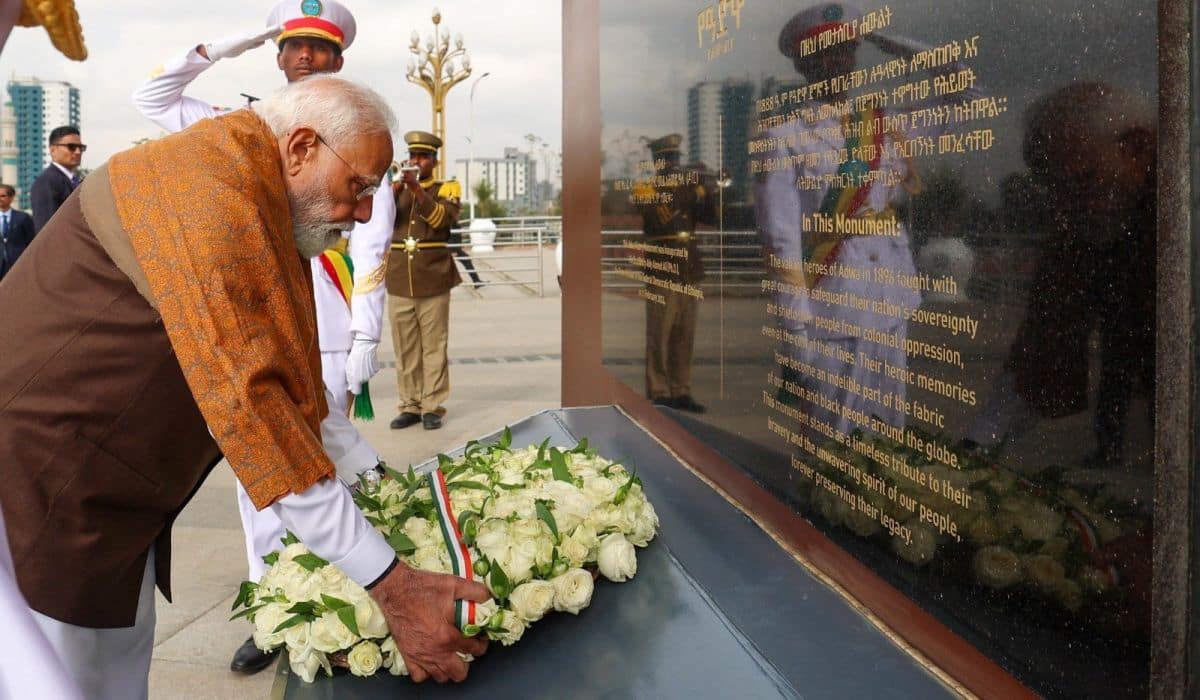The Prime Minister, Shri Narendra Modi inaugurated Phase 1 of Modi Shaikshanik Sankul, an educational complex for needy students in Ahmedabad, Gujarat today. The project will help provide facilities to students for holistic development.

The Prime Minister cut the ribbon to mark the inauguration of the Bhavan. Shri Modi also lit a lamp on the occasion and took a walkthrough of the Bhavan,
Addressing the gathering, the Prime Minister said that he was fortunate to perform darshan and pooja before Maa Modheshwari yesterday. The Prime Minister recalled when General Cariappa narrated an interesting story. He said that wherever General Cariappa went, everybody used to salute him out of respect, but he experienced a different kind of joy and gratification when the people of his village felicitated him during a ceremony. Drawing an analogy to this incident, the Prime Minister thanked one and all for the blessing that his Samaj ushered on his return. The Prime Minister congratulated the members of the Samaj for making this occasion a reality and prioritising education. “It is true that the timeline did not match. But you did not give up the goal and everyone gathered and gave priority to this work”, he added.

Remembering the days when people from his Samaj had meagre opportunities to progress, the Prime Minister remarked, ``today we can see people coming forward in their own way in Samaj.” The Prime Minister pointed out that everyone worked together to set up a system of education, and this collective effort is the strength of the Samaj. “The path is right, and in this way, the welfare of the Samaj can be achieved” Shri Modi added, “As a Samaj, it is a matter of great pride that they tackle their problems, overcome humiliation, yet do not come in anyone's way.” The Prime Minister expressed happiness that everyone in the Samaj is united and thinking about its future in Kali Yuga.

The Prime Minister expressed his gratitude to his Samaj and said that he has to clear a debt of the Samaj. He further added that the son of this Samaj may have been the Chief Minister of Gujarat for a long time, and has now become the Prime Minister of the country for the second time, but even in the midst of the responsibilities of his long rule, not a single person from this Samaj came to him with personal work. Shri Modi pointed out the sanskar of the Samaj and saluted them wholeheartedly with respect.
The Prime Minister expressed happiness that more youngsters are focusing on medicine, engineering and other such streams. Laying stress on skill development, the Prime Minister talked about the hardships that may arise during completing the child’s education, and advised the parents to prepare them for skill development. He said that skill development empowers them in such a way that they will never have to look back. “When there is skill development, there is skill, then they will never have to look back. The times are changing friends, the power of those who are more skilled than those holding degrees needs a boost”, Shri Modi added.

Recalling his interaction with the Prime Minister of Singapore during an official visit to the country, the Prime Minister said that he was persuaded to visit an industrial training institute that was set up by the Prime Minister of Singapore himself. Upon visiting, the Prime Minister remembered its modernity and said that after the formation of this institution, the situation is such that rich people stand in line to get admitted. The Prime Minister added that the Samaj has also been explained its greatness, and now our children can take part in it and feel a sense of pride.
Concluding the address, the Prime Minister remarked that labour also has tremendous power, and a large section of our Samaj belongs to the hard-working class. “Be proud of them”, he said. The Prime Minister expressed pride that the members have never allowed the Samaj to suffer nor did anything wrong with any other Samaj. “It will be our endeavour, I am sure that the coming generation will progress with great pride”, Shri Modi concluded.

Chief Minister of Gujarat, Shri Bhupendra Patel, Members of Parliament, Shri C R Patil and Shri Narhari Amin, Minister of Gujarat Government, Shri Jitubhai Vaghani, and President of Shri Modh Vanik Modi Samaj Hitvardhak Trust, Shri Pravinbhai Chimanlal Modi were those present on the occasion among others.
I want to emphasise that societies that focus on education will succeed. Thus, I hope we keep focusing on ways to make education more accessible to the youth: PM @narendramodi
— PMO India (@PMOIndia) October 10, 2022
I am glad that more youngsters are focusing on medicine, engineering and other such streams. At the same time, I want to stress on the importance of skill development as well: PM @narendramodi
— PMO India (@PMOIndia) October 10, 2022














